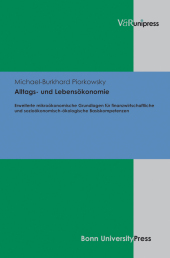 Neuerscheinungen 2011Stand: 2020-01-07 |
Schnellsuche
ISBN/Stichwort/Autor
|
Herderstraße 10
10625 Berlin
Tel.: 030 315 714 16
Fax 030 315 714 14
info@buchspektrum.de |

Michael-Burkhard Piorkowsky
Alltags- und Lebensökonomie
Erweiterte mikroökonomische Grundlagen für finanzwirtschaftliche und sozioökonomisch-ökologische Basiskompetenzen
2011. 285 S. 24.5 cm
Verlag/Jahr: V&R UNIPRESS 2011
ISBN: 3-89971-855-0 (3899718550)
Neue ISBN: 978-3-89971-855-3 (9783899718553)
Preis und Lieferzeit: Bitte klicken
Eine Neuorientierung in der ökonomischen Bildung für Kinder, Jugendliche und Erwachsene.
Viele Studien belegen, dass das ökonomische Wissen und Können in der Bevölkerung unzureichend ist, sogar bei Jugendlichen, die in Wirtschaftskunde unterrichtet worden sind. Die real existierende, ökonomisch bestimmte Lebenswelt wird in diesem Band als Alltags- und Lebensökonomie bezeichnet; die Menschen in ihren primären Kontexten von Haushalt und Familie werden als Akteure und Ressourcen bei der Gestaltung ihrer Lebenslage gesehen. Dies gilt besonders für freiheitlich verfasste Marktgesellschaften. Die herkömmliche ökonomische Bildung nimmt dies mit ihrer Orientierung an der volkswirtschaftlichen Standardlehre nicht angemessen wahr. Michael-Burkhard Piorkowsky stellt die erweiterten mikroökonomischen Grundlagen, die empirische Fundierung und ausformulierte Bildungskonzepte umfassend dar. Die Erweiterungen stammen aus der Institutionenökonomik, der Haushalts- und Familienökonomik, der Verbändeökonomik, der Evolutorischen Ökonomik, der Verhaltensökonomik, der Umweltökonomik und der Ökologischen Ökonomik.Das Buch liefert damit die Grundlage für eine Neuorientierung in der ökonomischen Bildung.
The book provides a new approach in economic education that is called real life economics. Several studies evaluate an inadequate knowledge and a lack of skills for addressing the economic needs. This holds true for the population in general as well as for adolescents with an economic education in school. One reason can be seen in the conventional economic education that is grounded on the economic standard theory which is not appropriate for the real life economy. In real life people are embeded in the primary context of the household and family. They are basic actors as well as basic resources to design the everyday living in an economic dimension of the life process. This is especially true for liberal market economies. With an expanded micro economic theory, empirical data and formulated educational concepts a new foundation for economic education is developed. The expansions come from institutional economics, household and family economics, economics of associations, evolutionary economics, behavioral economics, environmental economics and ecological economics.


